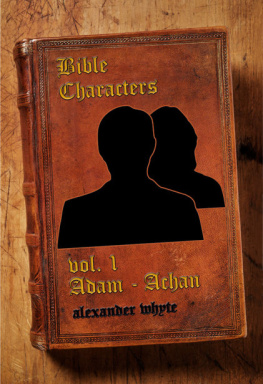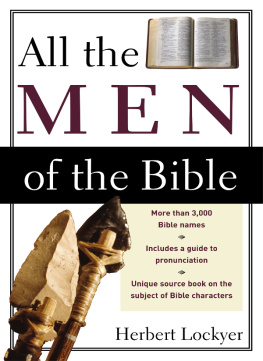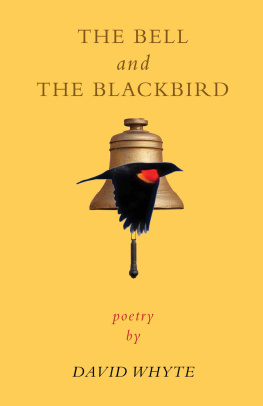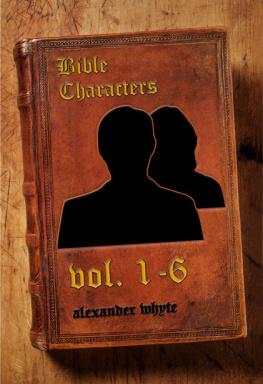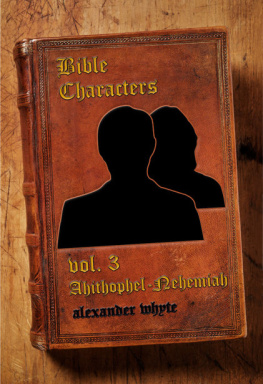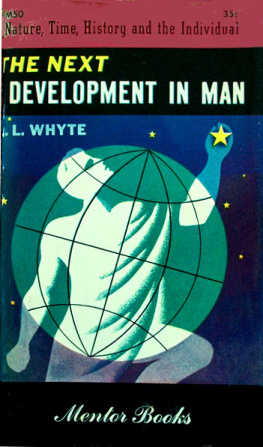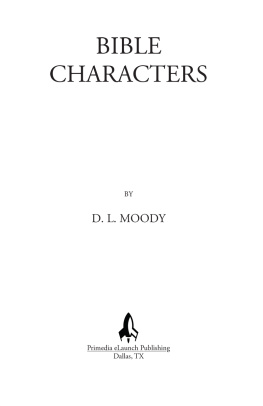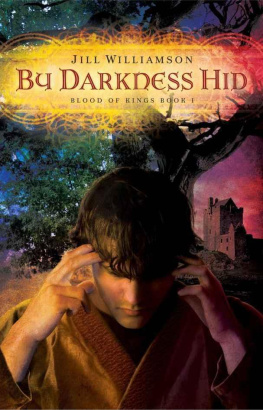Alexander Whyte - Bible characters. / Adam to Achan
Here you can read online Alexander Whyte - Bible characters. / Adam to Achan full text of the book (entire story) in english for free. Download pdf and epub, get meaning, cover and reviews about this ebook. City: Edinburgh, year: 1898?, publisher: Oliphant Anderson and Ferrier, genre: Science. Description of the work, (preface) as well as reviews are available. Best literature library LitArk.com created for fans of good reading and offers a wide selection of genres:
Romance novel
Science fiction
Adventure
Detective
Science
History
Home and family
Prose
Art
Politics
Computer
Non-fiction
Religion
Business
Children
Humor
Choose a favorite category and find really read worthwhile books. Enjoy immersion in the world of imagination, feel the emotions of the characters or learn something new for yourself, make an fascinating discovery.
- Book:Bible characters. / Adam to Achan
- Author:
- Publisher:Oliphant Anderson and Ferrier
- Genre:
- Year:1898?
- City:Edinburgh
- Rating:3 / 5
- Favourites:Add to favourites
- Your mark:
- 60
- 1
- 2
- 3
- 4
- 5
Bible characters. / Adam to Achan: summary, description and annotation
We offer to read an annotation, description, summary or preface (depends on what the author of the book "Bible characters. / Adam to Achan" wrote himself). If you haven't found the necessary information about the book — write in the comments, we will try to find it.
Bible characters. / Adam to Achan — read online for free the complete book (whole text) full work
Below is the text of the book, divided by pages. System saving the place of the last page read, allows you to conveniently read the book "Bible characters. / Adam to Achan" online for free, without having to search again every time where you left off. Put a bookmark, and you can go to the page where you finished reading at any time.
Font size:
Interval:
Bookmark:
BibleCharacters
Adam to Achan
by
AlexanderWhyte, D.D.
published by
OliphantAnderson and Ferrier
edinburgh and london
BibleCharacters
I
let usmake man iN our image
I N the wise andgood providence of Almighty God a new and an entrancing light has been cast inour day on the origin of the earth and on the early ages of mankind. A noblesuccession of ministers and interpreters of nature has been raised up in theselater generations who, by the labours they have undertaken, and by the methodsthey have followed, have been enabled to make discoveries that had not enteredthe mind of man to imagine in former ages. Up till our day far more was knownabout the way and process of our redemption than about the way and process ofour creation. But it will be in the complete and harmonious combination ofthese two kinds of knowledge, divine revelation and human science, that weshall come to a perfect man, in which the whole body of knowledge and faith andlove shall be fitly joined together and compacted by that which every jointsupplieth.
Magnificent as have been the services ofsuch men as Herschel, and Faraday, and Lyell, and Darwin, and Spencer, at thesame time their magnificent services have Iain far more in the regions ofmatter and motion than in the mind and the heart of man. It is enough for anyman, or for any school of men, to be enabled to take us back to the firstbeginnings of this present system of things, when as yet our earth was withoutform and void, and to lead us up step after step, age after age, till we openour eyes on this wonderful world as it now is. To one of His servants God givesthe talents of revelation and inspiration, and to another the talents of observation,and experiment, and discovery, and the exposition of discoveryto each one ofHis servants separately as He will. And to each several steward and servant ofHis, according to his faithfulness to the talents committed to him, his Masterat His coming will say, Well done! And it is surely a kind of forecast andforetaste of that Well done!the warm exclamation of wonder and of worshipthat rises out of our enlarged minds and exalted hearts as we lay down TheOutlines of Astronomy, The Principles of Geology. The Origin of Species, TheFirst Principles, and such-like books. At the same time, at their best,those ministers and interpreters of nature do not satisfy their readers. Evenin their own rich and well-worked fields they do not satisfy all their readers.Even after they have led us so far up on the shining path of scientific truth,we feel sure that there are still sources and paths and fields of light, aswell as shadows and belts and whole worlds of darkness, over which we have beenhurried, and into which we have not been led or let look. We feel not unlikethat famous philosopher of our day who divined that there must surely be aserious disturbance somewhere in the order and stability of the solar systemthat no astronomy had as yet discovered, acknowledged, or attempted to accountfor. As we are carried away by the spell of the great writers on evolution, wefeel all the time that, after all has been told, there is still somethingunrecognised and undescribed from which we suffer the most disturbing andinjurious influences. All the time we feel in ourselves a backward, sideward,downward, perverse pull under which we reel and stagger continually; it is anexperience that makes us wiser than all our teachers in some of the most obscure,but at the same time some of the most certain matters of mankind and theirspiritual history. Speaking for myself, as I read the great books of our modemscientific men with a delight and an advantage I cannot put enough words upon,I always miss in themin them all, and in the best of them alla matter of moreimportance to me than all else that they tell me. For, all the time I amreading their fascinating discoveries and speculations, I still feel in myselfa disturbance, a disorder, a disharmony, and a positive dislocation from themoral, and even from the material, order of the universe around me and aboveme: a disorder and a dislocation that my scientific teachers neitheracknowledge nor leave room for its acknowledgment or redress. That is magnificent!That is noble! That is divine! I exclaim as I read. But when I come to the endof my readingIs that all? I ask. I am compelled by all my experience and allmy observation to ask, Is that all? Is that your very last word to me? Then, ifthat is all, I must still go in search of a philosophy of nature and of manthat understands me, and accounts for me, and has, if so be, a morecomprehensive, a more scientific, a more profound, and a more consoling messageto me. In one word, and to speak out the whole of my disappointment andcomplaint in one word, what about sin ?What in sin ? When and where did sin enter in the evolution of the humanrace and seize in this deadly way on the human heart? Why do you all so avoidand shut your eyes to sin ? And,still more, what about Jesus Christ ?Why do I find nothing in your best text-books about Him who was withoutsin ? About Him who is more to me, and to so many more of your bestreaders, than all Nature, and all her suns, and systems, and laws, andprocesses put together? Far more. For He has carried both our understanding andour imagination and our heart so absolutely captive that we cannot read withour whole heart the best book you have written because His name is not in it. Who and what is he , weinsist, who has leapt at a bound above all taw and all order of matter and ofmind, and of cosmic and ethic evolution, and has taken His stand of holiness atthe head of the human race? Schools of science, schools of morals, schools ofphilosophy, ministers and interpreters of nature and of man, what is sin ? and what think ye of Christ ?
Bishop Butler has taught us, and thatwith an impressiveness we can never forget, that knowledge at its best is notour proper happiness. With all his immense weight Butler has impressed upon usthat our proper province is virtue and religion, life and manners; the scienceof improving the temper and making the heart better. This is the field assignedus to cultivate, he exclaims, and how much it has lain neglected is indeedastonishing! And thus it is that Moses, so to call him, with two or threesplendid strokes, passes over all that which so fascinates and absorbs ourmodern men of science, and takes up mankind at that point when they have theimage and likeness of God completely and perfectly stamped upon them. Nor doesMoses delay long, even upon that, but, after one great and fruitful word uponthat, he passes on to take up at more length, in his own wonderful way, and inanswerable style, the temptation and the fall of Adam and of all Adamsoffspring. The Scripture begins, says Butler, with an account of Godscreation of the world, in order to ascertain who He is concerning whoseprovidences, commands, promises, and threatenings this sacred book all alongtreats, the Maker and Proprietor of the world, He whose creatures we aretheGod of Nature, Revelation, indeed, considers the common affairs of this world,and what is going on in it, as a mere scene of distraction, and cannot besupposed to give any account of this wild scene for its own sake. This earth,our habitation, has everywhere the appearance of being a ruin, and revelationcomes in on the supposition that this world is in a ruined state. Thus Butler.And Moses begins his priceless contribution to that revelation by telling uswhat, without him, would have remained a dreadful mystery to usthat is to say,he tells us how man was made upright, and how he fell from that estate whereinhe was created by sinning against God. It is a fashion with the prevailingphilosophy of our day to decry and contemn the old, orthodox, and fruitfulargument from final causes; but I shall continue, in this matter also, tofollow Bishop Butler, to me by far the deepest and the wisest philosopher theworld has ever seen. Now Moses, long before Butler, is clear and sure as to thefinal cause of our creation. In his opening pages, Moses, after his royalmanner, lets us hear the Maker of all things taking counsel with Himselfconcerning His end and object in the creation of man. Let us make man in ourimage, after our likeness. And then, from this and from many other Scriptures,we learn that the image and likeness of God is love: love, knowledge,righteousness, and true holiness, with dominion over the creatures.
Next pageFont size:
Interval:
Bookmark:
Similar books «Bible characters. / Adam to Achan»
Look at similar books to Bible characters. / Adam to Achan. We have selected literature similar in name and meaning in the hope of providing readers with more options to find new, interesting, not yet read works.
Discussion, reviews of the book Bible characters. / Adam to Achan and just readers' own opinions. Leave your comments, write what you think about the work, its meaning or the main characters. Specify what exactly you liked and what you didn't like, and why you think so.

